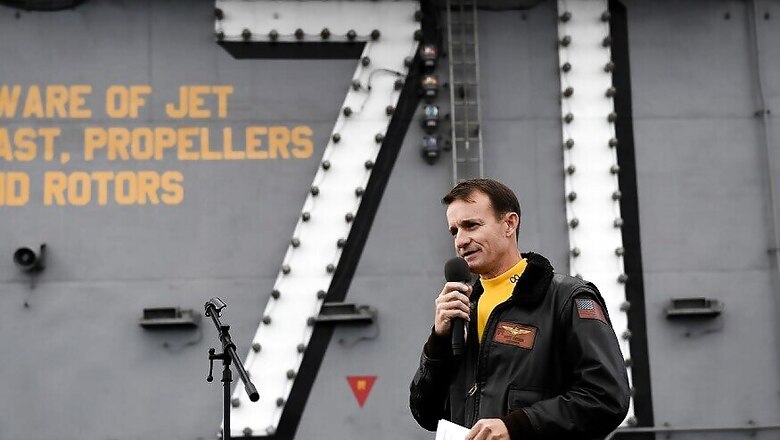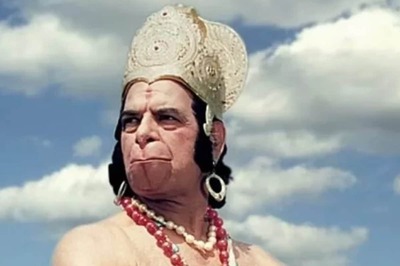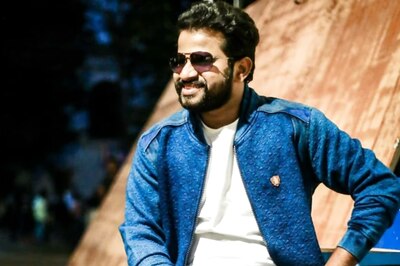
views
On March 31, the San Francisco Chronicle published a letter written by Captain Brett Crozier, commanding the aircraft carrier USS Theodore Roosevelt (TR), titled ‘Request for Assistance in Response to COVID-19 Pandemic’.
At that time, 33 sailors aboard the ship had been diagnosed with Covid-19. In his letter, Crozier pointed out that TR is “unable to comply with CDC (Centers for Disease Control and Prevention) protocols” due to the “warship’s inherent limitations of space” and recommended that to "prevent unnecessary deaths," a majority of the crew be removed from the aircraft carrier and isolated for two weeks.
It is not exactly known as to what forced the US Navy Captain to take this unprecedented step of breaking military protocol by sending the letter to numerous addressees, some of whom were not in his chain of command.
However, the net result was that Crozier was relieved of his command for what Navy Secretary Thomas Modly called the demonstration of “extremely poor judgement in the midst of a crisis." Crozier was given a rousing farewell by his crew, one of whom was heard saying, “That's how you send off one of the greatest captains you've ever had.”
A few days later, an audiotape of Modly’s address to the TR’s crew was leaked. In his speech, Modly remarked that Crozier was either “too naïve or too stupid” to be in command. He went on to say that Crozier’s actions were a “betrayal of trust” and had “compromised critical information” about the mission readiness of the ship. The political storm kicked up by Modly’s remarks forced him to put in his resignation.
The Crozier case has been extensively discussed in the media and among military forums. As usual, there are differing viewpoints on whether Crozier was right or wrong. The military has to remain a highly disciplined force where the chain of command is rigidly followed. In matters of professional judgement, greater knowledge of the superior officer must be assumed. If doubts arise about this, instant obedience will not be forthcoming, battles will be hesitantly fought, and lost.
It could appear that there are no ambiguities in how soldiers operate because standards of behaviour seem almost cast in stone. However, the reality is that the military ethos, which guides professional conduct, is not a part of formal documents but is more of an internal realisation of what must or must not be done. This, more than an official diktat, gives value to the ethos.
In a 1994 study on effective unit performance, the US Army Research Institute for Behavioral and Social Sciences wrote, "When the chips are down, there is no rational calculation in the world capable of causing an individual to lay down his life. On both the individual and collective levels, war is, therefore, primarily an affair of the heart. It is dominated by such irrational factors as resolution and courage, honor and duty and loyalty and sacrifice of self."
If military ethos and values are an affair of the heart, moral dilemmas are bound to arise. Crozier’s actions must be seen in this backdrop.
“Mission first. Soldiers always” is a mantra among all militaries. The mission always has primacy, but the welfare of soldiers is also a fundamental consideration for leaders. The Chetwode motto has been the guiding principle of all officers of the Indian Army, and it states:
Military ethos is centered on building a culture that promotes a bonding in which soldiers have immense faith that their comrades and leaders will come to their aid, irrespective of the risks. This also puts enormous pressure on leaders because in the accomplishment of the mission, they have to expend their most valuable resource – human lives of soldiers with whom there is a very close attachment.
The dilemma of mission vs. lives is perhaps easier to overcome during a war, but even in those times, victory must be achieved with minimum loss. As Noel Gayler, a US Navy admiral put it, “if you can’t figure out something better to do with a military force than to kill a lot of people and lose a lot of people in the hope that the other guy will get tired of the bloodletting before you do, you are not only not much of a leader, but you’re not an ethical one either.”
In peacetime, the mission vs. lives dilemma poses a more significant challenge. This is perhaps what forced Crozier to pen down these lines, “We are not at war. Soldiers do not need to die. If we do not act now, we are failing to properly take care of our most trusted asset – our Sailors.”
Modly accused Crozier of betraying his trust and that of his chain of command. Loyalty is a vital component of the military ethic, but this loyalty is more to the values of an organization rather than only to the superiors.
In 1999, the Indian Army Training Command published a Code of Conduct for Officers, in which it was written, “Loyalty has to do with faithfulness, firmness in allegiance, and personal devotion, but in an ambience of legitimacy and lawfulness conforming to an accepted standard… This framework of loyalty – legitimacy must be clearly understood.”
Loyalty must be given to senior officers and political leaders, but a line drawn at the bounds of ethical conduct. Richard A Gabriel has expressed the imperative succinctly, "Loyalty to one's superior is never anything, but a conditional relationship predicated on the continuing perceptions of one's subordinates that their superior is acting honorably in his position of command."
Some of you reading this may say that, in reality, it is much harder to practice what is preached in books and articles. It is true that it is not easy to make career-threatening decisions and that the line between loyalty and disloyalty is seldom clear-cut. However, the nature of the military profession also demands a display of exceptionally high standards of leadership.
Military leaders are at the top of one of the great power structures of society. Their behaviour has enormous implications, not only for the organization they serve but also for the society at large. It is for this reason that they are held to higher moral standards. One indicator of a good leader is the respect that is earned from the followers. At least by that yardstick, Captain Crozier should be lauded.




















Comments
0 comment